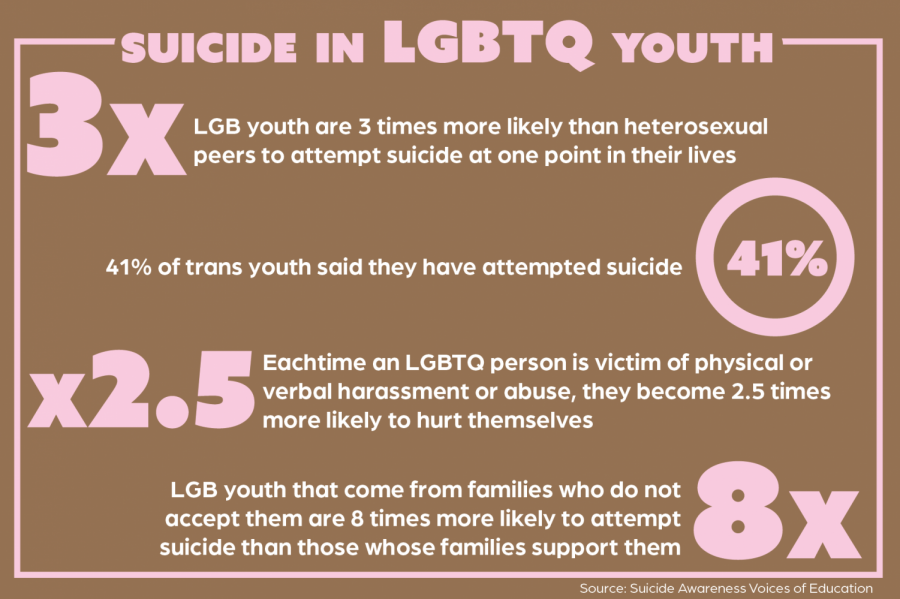LGBTQ youth at increase risk of suicide
September 20, 2021
One in three LGBTQ youth report being physically or verbally harassed in their lifetime due to their sexual orientation or gender identity, according to a 2020 study by The Trevor Project.
The harassment LGBTQ individuals face can range from being called derogatory names to physical abuse experienced at school.
Even though it may not seem like it, the abuse and harassment LGBTQ individuals face daily can have a lasting impact.
According to IMPACT, each instance of LGBTQ victimization increases the likelihood of self-harming behavior in LGBTQ individuals by 2.5 times on average.
On top of physical and verbal abuse, many LGBTQ individuals struggle with other mental health problems such as generalized anxiety disorder, depression and suicidal thoughts.
A combination of decreased mental health and abuse can lead to LGBTQ individuals contemplating or even attempting suicide.
According to Newport Academy, LGBTQ individuals are 3.5 times as likely as their heterosexual peers to attempt suicide.
William McCown, the director of the School of Behavioral and Social Sciences, said he believes LGBTQ individuals are often pushed to their breaking point and feel they have no other option but suicide.
“LGBTQ people still too often endure blatant harassment and violence,” McCown said. “Over time, research suggests, marginalized people just become worn down by this constant strain.”
LGBTQ individuals also experience many other life strains that heterosexual individuals do not such as rejection by friends or family, homelessness and stress around therapy.
According to McCown, there can be a disconnect between LGBTQ individuals who need counseling and counselors providing services to LGBTQ individuals.
“Improving mental health services for LGBTQ+ individuals is a demonstrated, successful intervention,” McCown said. “Unfortunately, some places make it difficult for people, especially LGBTQ+ people, to access mental health treatment. Many people still view seeking counseling as a stigma.”
Mallory Grayson, the president of LAMBDA, agrees with McCown and feels that creating safe spaces for LGBTQ individuals can drastically improve their quality of life.
“We [should] strive to create spaces that are more accepting and understanding,” Grayson said. “This might be an inclusive club, a clinic with trained staff that is open to seeing LGBTQ patients or an LGBTQ support group.”
Support groups and other services for LGBTQ individuals are offered in many different forms at ULM.
From counseling workshops to support groups, there is always a place on campus for LGBTQ individuals.
While these all sound like great opportunities, McCown acknowledges that counseling can be intimidating for LGBTQ individuals because it may be viewed as shameful.
However, he encourages society to change this perception together.
“Counseling can help everyone, from every community,” McCown said. “Seeking counseling is always a sign of strength.”



